|
As a subgenre of the crime drama, the prison movie is saddled with a number of conventions whose inclusion in one form or another even now seem to be obligatory. The story will usually be told from the view of a sympathetic and perhaps wrongly incarcerated inmate, the warder will be a hard and uncaring brute, gangs will control all activity and dealings within the prison itself, a wise old-timer will be on hand to show our hero the ropes and help him survive those first few torturous months, a good-hearted prisoner will be broken when his pet is taken from him or his hobby destroyed (usually by the governor or a particularly nasty guard), escape attempts will fail until our boy takes his turn, and so on...
This would seem to render any new prison drama tired by default, a repackaging of elements we've seen played out umpteen times before, and yet you'll find almost every one of the above components in Frank Darabont's 1994 The Shawshank Redemption, a relatively recent genre work adapted from a Stephen King short story that is now widely celebrated as one of the finest films of late twentieth century cinema. Which just goes to show that if a story is well told, the fact that much of it has been told before in one form or another really doesn't matter. There's also an inevitability to the recurrence of these elements in a genre set almost exclusively in restrictive and rule-driven micro-society, one whose real life equivalent is subject to many of the very same clichés. Warders may not all be the sadistic hard-asses of film lore, but given the nature of their job, they're unlikely to be kind-hearted softies either. The prison gang problem has been extensively documented, and the fate of inexperienced young inmates and institutionalised old hands can be very much down to chance and the company they find themselves banged up with. And the preference for building the story around a young first timer and his rude awakening to the grim realities of prison life is both logical and understandable, providing a point of identification for an audience which, for the most part, has never seen the inside of a prison cell.
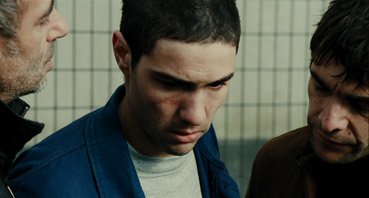
The enigmatically titled Un prophète [A Prophet] is just such a prison story, and it arrived in the UK earlier this year on the back of phenomenally good word-of-mouth, a Grand Prix win at Cannes, and board-sweeping success at the 2010 César Awards. It certainly has its share of stock components, but like Shawshank it treats them as if they they were being committed to film for the very first time. But this is also a work that is aware of its generic antecedents and of the importance of not simply re-treading the same ground in the same regulation uniform and boots. And like Stephen King and Frank Darabont before them, writers Abdel Raouf Dafri, Nicolas Peufaillit and Thomas Bidegain, and writer-director Jacques Audiard really know how to tell a story.
The central character here is Malik El Djebena, whose name should clue you in to the first of a series of chances Audiard takes with mainstream audience identification. Yep, he's not the good-looking caucasian innocent of Shawshank and its brethren, but 19-year-old French Arab with a petty criminal past. Not like you at all, then, huh? This is Malik's first experience of adult prison and he's not been there long before he's mugged for his trainers and offered drugs for sex by fellow Arab prisoner Reyeb. It's then that he's approached by Corsican Mafiosi kingpin César Luciani and asked to do a job for him. Well, not so much asked as ordered, and when I say job I mean kill someone. It turns out that Reyeb is due to testify against the Mob, and orders have come from outside through to César to take the man out. But Reyeb is effectively in protective custody, and is suspicious of everyone and careful about who he lets near him, which is where Malik and that earlier sexual proposal come in.
And it's here that you can happily put all those idiotic prejudices about the innocence and cultural background of your lead characters aside and empathise with the impossible position that the hapless Malik finds himself. Put yourself in his place. You've never killed anyone and the very thought of it horrifies you, but you're at the start of a six-year stretch and have been ordered to commit murder by someone who could have you rubbed out in the blink of an eye. You know the prisoner's code about squealing but figure that if you can just find a way to alert someone in authority to what's going on then you might be able to prevent it, or at least be safely removed from the scene. What you don't realise is that the guard you chose to speak to about it is on César's payroll, and instead of the hoped-for chat with the governor you are forcibly restrained and a plastic bag is pulled over your head and held there until the consequences of non-co-operation are thumping through your lungs and temples. So just what do you do now?
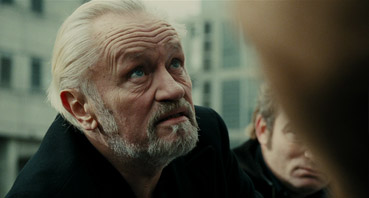
What follows are two sequences that are likely stay with you long after you leave the cinema and provide the first pointers to just why Un prophète has attracted such acclaim. Malik arranges the meeting with Reyeb but is assured he'll be searched and so cannot conceal a weapon in his clothing. Instead he's shown how to hide a razor blade in his mouth between his teeth and his cheek, and how to manipulate it with his tongue to a position where it can be used to slash Reyeb's throat. Just think about those two things for a second: razor blade and mouth. Then think about even putting the former in the latter, let alone poking it around with your tongue in an effort to place it between your teeth. As Malik stands practicing the manoeuvre before a mirror, wincing and spitting out blood with each small mistake, there wasn't a person at the screening I attended who wasn't groaning or audibly sucking air through their teeth.
And then there's the killing itself, which after a build-up whose tension borders on the unbearable is every bit as clumsy and messy and horrible as such things doubtless are in real life. It's a life-changing deed that earns Malik a protected place on César's crew and the privileges that come with it, a small step up that soon leads to bigger things. Never really accepted by the racist Corsicans and distrusted by his fellow Muslims, Malik falls into the role of general dogsbody for César's crew, quietly setting up a sideline drug distribution network with the aid of fellow inmate Jordi. Later, he is entrusted by César with a series of special tasks to be undertaken on the outside during brief spells of rehabilitative leave. Here he teams up with former inmate Ryad, with whom he has become close friends, and begins organising increasingly ambitious deals of his own.
As a tool for punishment and rehabilitation, prison fails Malik almost from the moment he walks through its door, transforming him from a petty criminal into a murderer, and providing opportunities for career advancement through the distribution of narcotics and programmed education that ultimately helps him to climb the criminal ladder. His association with César brings rewards that outstrip anything the prison at even its most lenient could offer, and teaches him the sort of life lessons and a ruthless eye for business that regular society has failed to provide.
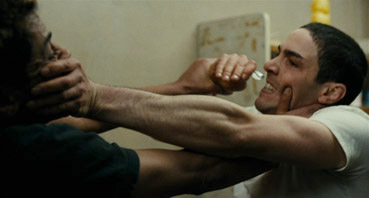
And it all feels so damned real, every prison-hardened face, every intimidating stare, every sudden burst of violence or angry outburst. Institutional touchstones aside, there's a very real freshness to all aspects of the film, which comes in part from the locational switch from what is traditionally American cinematic turf and the casting of unknowns in roles to which they seem almost genetically suited to play (many of the extras are played by real ex-convicts, bringing a subconscious authenticity to background detail). And don't be put off by their lack of experience – Audiard's perfectionism (check out the documentary on this disc to see how extensively he works with even the supporting cast on every scene) and some spot-on casting assures that there's not a wrong note in any of the performances. Tahar Rahim in particular makes a serious impression in his first leading role (previously he was a bit-part player in roles such as 'Taliban Interrogator' in the 2006 The 9/11 Commission Report), utterly convincing in his gradual transformation from nervous newcomer to confident opportunist and fully justifying Audiard's conviction that he was perfect for the role almost from the moment the two first met. Matching him all the way is the excellent Niels Arestrup, the film's only name actor (he was memorably weary as Thomas's father Robert in Audiard's previous The Beat that My Heart Skipped [De battre mon coeur s'est arrêté]), who brings a sometimes frightening authority to the role of César, an ageing gang boss who is defined by his position of power within the prison. An unpredictable hair-trigger of boredom-fuelled anger, his relationship with Malik is closer to that of master and servant than the crime movie norm of father and son. But as actor Tahar Rahim notes elsewhere on this disc, a good servant learns from his master, and it's in this role that Malik grows and matures and develops his own set of criminal ambitions.
Gripping though the prison drama is – and it really is – it's when Malik is granted temporary leave that the tension really cranks up, as he's sent on missions whose purpose or intended outcome are initially a mystery and is required to cover the sort of distance that seems almost unfeasible in the allotted time. This does, like Ripley's against-the-clock rescue at the climax of Aliens, ensure that every small delay or hiccup decreases the likelihood of him making it back at the appointed hour. This is especially true of his second excursion, where a plane trip and car journey are interrupted when the man he has been sent to meet points a gun in his face and calls his credibility into question.
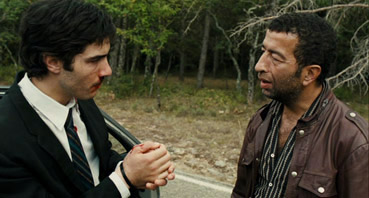
There's so much to get excited about in Audiard's standard-setting prison drama – including a superb final shot whose full potency relies on our knowledge of crime movies that have gone before – that to cover it in the sort of detail and length it deserves would mean spoiling things for those who have yet to see it. Easily sustaining its two-and-a-half hour running time and taking more than its share of risks – having Malik converse with the ghost of Reyeb never feels as incongruous as it doubtless sounds and actually adds depth to his character – Un prophète is a rare example of a film that lives up the accolades and praise that have been thrown at it. It's a consistently gripping and character-driven story unblemished by sentimentality or melodrama and one that is surely destined to stand the test of time as one of the all-time great prison movies.
An impressive 1.85:1 anamorphic transfer that accurately captures the film's intentionally dour look and toned-down colour scheme without sacrificing contrast or shadow detail, even in darker sequences, while the overexposed feel of some of the prison yard exteriors is true to how the film looked in the cinema. The level of detail is excellent for DVD and probably even better on the Blu-ray, and there are no obvious signs of edge enhancement or compression artefacts.
The choice between Dolby stereo 2.0 and Dolby 5.1 soundtracks, both in the original French (I shudder to think how this one might end up with an English dub), is not as one-sided as you might expect, in part due to the quality of the recording and mix on both tracks. But in the end 5.1 wins out, for the finesse of its handling of Alexandre Desplat's score, for the superior kick of gunshots and a semi-surreal vehicle collision that provides the film with its title, and for the use of surrounds for prison and weather ambient sound.
This is a 2-disc release whose extra features are all on disc 2.
Deleted Scenes (10:40)
A small collection of edited scenes that were dropped from the final cut, all of which are of real interest and viewable with or without a director's commentary. Actually, a director's introduction might be a more accurate description, as Audiard talks only over the first part of each scene, but always explains why the sequence was (sometimes reluctantly) removed, which is just what we want to know. My natural inclination is to suspect that when there's a director's commentary on deleted scenes, there somewhere must also be a commentary for the main feature, but I've not been able to track it down yet.
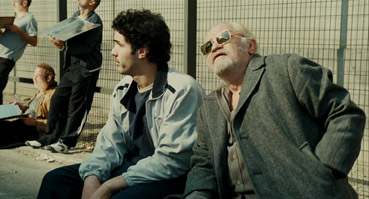
A Prophet – Revealed (14:32)
Director Audiard and lead player Rahim talk about a number of aspects of the film's production, including the casting of Rahim and Arestrup, the advantage of using of real ex-prisoners as extras, Audiard's take on the character of Malik, the occasional dips into surrealism, and the problems of spending four years on a single film project.
Tahar Rahim Screen Tests (4:58)
It's always interesting to watch a first-draft performance stripped of the accessories of the shoot itself. Rahim makes a confident impression in screen tests for a number of scenes, and it's not hard to see what so impressed director Audiard, whose wobbly camerawork on the second audition suggests that this is not exactly his forte.
Rehearsals (8:54)
Watching actors rehearse for real is always a thrill, as it's here that the script really comes to life for the first time. Rahim's confidence in the role is even more pronounced here.
Derrière le barreaux (Behind Bars) (72:03)
Oh, if only there were more making-of documentaries like this, ones that are properly filmed and edited by a commissioned filmmaker – in this case Antonin Peret Jako – rather than the formless collection of cobbled-together DV footage we usually get served. An informative and always interesting mix of interviews, rehearsal footage, shoot preparations and scene filming, it knows when to let a scene run uninterrupted, providing an enlightening peek at Audiard's meticulous way with the small details of performance, and illustrating just how much time and effort it can take to get a scene right. There are also plenty of actual recollections of prison life from the ex-cons who acted as extras, though we never get to see their faces.
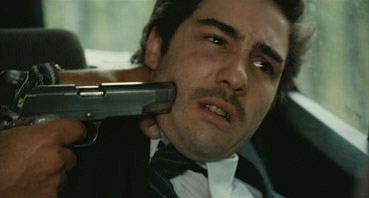
Un Prophète à Châtenay (23:34)
A raggedly structured but still worthy video diary by Jean-Michel Correia of the build-up to a screening of the film in the Châtenay district of Paris, where many of the film's extras were recruited. Curiously, most of those interviewed had their parts cut from the final edit, but we do get a peek at a side of Paris that that you won't find on tourist brochures, and the recording of an anti-prison radio show called L'Envolée, on which members of the cast and crew appear as guests. The point that there are precious few decent film roles for French Arabs is well made.
Trailer (1:20)
A nicely assembled sell for a movie bristling with good trailer material.
Enough has been said in praise of Un prophète to ensure that for some it will never live up to the hype, so to speak. But in a subgenre dominated by stock characters and formula, this thoughtful, authentic and multi-layered film is a compelling breath of fresh air, in its writing, in its characters, in the directness of its violence, and in Audiard's masterful handling. Of all that I've read in support of the film, my personal favourite is by journalist and ex-convict Casper Walsh, who in an article in The Observer listing his favourite prison movies wrote: "Not since Scum have I seen a film so accurately depict what it's like to walk into a prison for the first time, young, shocked and utterly freaked out: stark, lifeless strip lighting, violence simmering on every landing, and the total loss of human warmth."* Seriously, how can you top that?
Optimum's double-disc DVD appears to sourced largely from the French Gie Sphe-Tf1 2-disc Collector's Edition, but I've no problem with that, as the second-disc extras are all of real interest and the picture and soundtrack are both of a high order. Whether you go for the 2-disc DVD or the identically specified single-disc Blu-ray, I refer you once again to the eminent Mr. Walsh and his Observer piece when he says, "If you want to get inside the real prison experience without committing a crime, forget about the illegal download and buy the DVD." Listen to the man. Highly recommended.
* http://www.guardian.co.uk/culture/2010/may/30/ten-best-prison-films
|